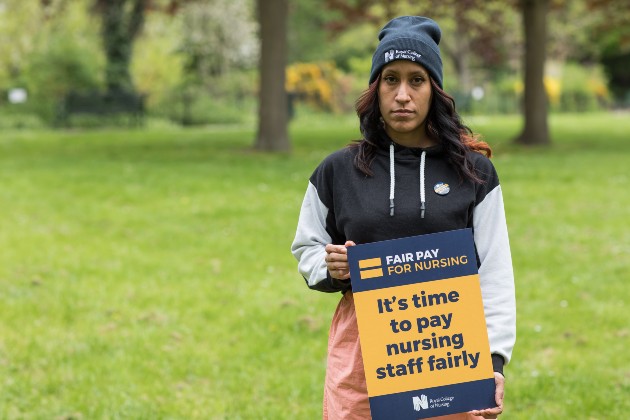What is the NHS Pay Review Body (PRB)?
Governments can use different routes to decide pay increases. Often UK governments ask review bodies to look at evidence and make recommendations on public sector pay before ministers set an award. We’ll talk about “UK governments” here – plural – because health is devolved across all four nations of the UK.
The PRB process is used in England, Northern Ireland and Wales.
In Scotland, our members have already voted to accept a pay award. Scotland had direct negotiations with the Scottish government. This is what we have been calling for across the UK.
The UK governments determine pay for NHS staff employed on Agenda for Change (AfC) contracts by instructing the NHS PRB to provide a recommendation.
There are four key stages to the NHS review body process
- Governments must issue a remit letter to the PRB. This letter from a minister sets the parameters and is the first indication of when a pay award might be announced. For the 2025/26 financial year, this was issued in September 2024 by the UK government.
- The PRB gathers evidence from relevant stakeholders including staff, employers and trade unions.
- The PRB reports back to the governments with recommendations on pay.
- The governments decide on the pay award for staff. The governments’ decisions are announced and the PRB’s report is released.
Is the RCN taking part in the NHS PRB process this year?
The RCN does not believe the NHS PRB is a fair or independent process for setting NHS pay. In recent years, our decision to submit has been based on a number of factors.
- We didn’t participate in the NHS PRB process for the 2023/24 pay award, as we were in active pay negotiations with the UK government.
- In 2024/25, we did participate, while highlighting the flaws of the process and urging the PRB to take this opportunity to prove its independence.
- Ahead of the 2025/26 pay award we did not submit evidence to the NHS PRB, calling instead for direct negotiations with the UK government alongside Unite and UNISON.
The NHS PRB process is only fit for purpose if it is truly independent from the various governments of the UK and makes pay recommendations based on evidence, not on the will of politicians or as a result of financial constraints.
What does the NHS PRB process look like this year?
Stage 1
The Secretary of State for Health and Social Care in England, Wes Streeting, wrote to the NHS PRB on 30 September 2024 asking it to advise on NHS pay.
The formal remit letter described the government’s intention to confirm “awards as close to the start of the NHS pay year on 1 April as possible”. It also stated the backdrop for the Department for Health and Social Care’s submission was the “challenging financial position this government has inherited, including a £22 billion pressure against the spending plans set out for departments at Spring Budget 2024”.
In November 2024 we called on the UK government again for direct negotiations regarding NHS pay.
In a joint letter, we warned that a million NHS staff in England, including nursing staff, will not receive their pay award for 2025/26 on time. We also criticised the outdated PRB process, stating it “risks repeating the mistakes of the past... that doesn’t fit with [the UK government’s] wider vision for a 21st-century NHS that has a stable and motivated workforce at its core”.
Following this, more than 2,700 nursing staff and 1,400 public supporters added their names to an open letter to MPs repeating this call for direct negotiations.
In early April, the PRB report was delivered to the Westminster government.
The Welsh government and Northern Ireland’s Executive have both received the 2025/26 Pay Review Body report, but no announcements will be made until the Westminster government announces the pay award.
The Scottish government put forward a pay offer for 2025/26 and 2026/27 in April 2025 following negotiations with the RCN and other health trade unions. RCN members voted to accept this offer in a consultation that closed on 14 May 2025.
Stage 2
Before making recommendations, the PRB can commission research on pay and related matters. It also visits NHS workplaces to hear from employers and staff, and it hears evidence from NHS trade unions (including the RCN), NHS Employers and organisations, and the government.
While the RCN did not submit evidence directly to the PRB in respect of this year’s pay award, we believe it should recommend the following:
- A substantial, above-inflation pay rise for nursing staff. Only this will begin to restore nursing pay and deliver the pay justice the profession deserves.
Stage 3
After considering all the evidence, the PRB makes recommendations on NHS pay to governments. This year, the PRB reported its findings to governments in April. We continue to pressure governments across the UK for timely action so members are not left waiting.
Stage 4
Governments consider the NHS PRB’s advice but pay awards and how they are funded are political decisions and ministers always have the option to invest in nursing.
What happens after the announcement?
Once governments announce pay awards after the PRB process, the RCN will consult with members regarding whether the award is enough.
Campaign with us for nursing to be valued through fair pay
The RCN’s Fair Pay For Nursing campaign continues to lobby governments for pay justice and better career pathways for nursing staff. This means a fully funded pay rise for NHS nursing staff on AfC contracts.
While the NHS PRB process applies to NHS staff, the RCN is clear there must be parity of pay and other terms and conditions for nursing staff in all settings. Read about our work to secure fair pay for GP nursing staff, and the employment standards which can support nursing staff in the independent sector to get fair pay, terms and conditions.
Find out more
-
Read our report – Pathway to progression: band 5-6 career progression for nursing








